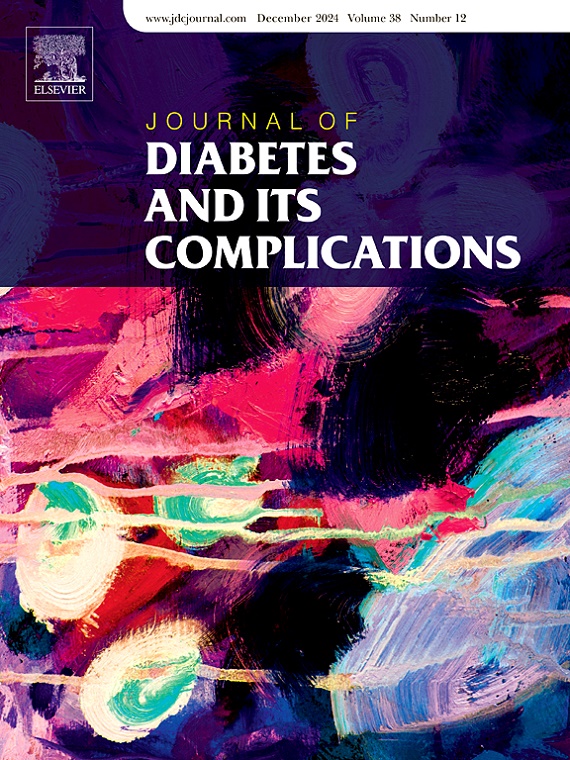Pharmacological effect of ZYGK1, a novel glucokinase activator, in hyperglycemic and sulfonylurea-resistant type 2 diabetes in mice models
IF 3.1
3区 医学
Q3 ENDOCRINOLOGY & METABOLISM
引用次数: 0
Abstract
Objectives
Type 2 diabetes is caused due to inadequate glucose utilization in the liver and pancreas due to insulin resistance. Glucokinase enzyme plays a key role in metabolism of glucose and insulin release and hence glucokinase activation can be a useful therapeutic target for treatment of type 2 diabetes.
Methods
Present study was conducted to investigate the effect of a novel glucokinase activator ZYGK1 in the preclinical models of diabetes in mice. The activity of ZYGK1 was evaluated using recombinant glucokinase, and isolated islets and hepatocytes. Acute effect on glucose disposal was evaluated in C57 mice and repeated dose effect was assessed in db/db mice, along with the evaluation in sulfonylurea-resistance db/db mice.
Results
ZYGK1 has potent glucokinase stimulating activity with EC50 of 43 nM and increased glucokinase activity in islets and hepatocytes in a dose-related manner. Oral administration of ZYGK1 (0.1 to 10 mg/kg) showed dose dependently improved glucose disposal and glucose dependent insulin secretion in oral glucose tolerance test (OGTT) in C57 mice. Repeated dose administration of ZYGK1 improved glucose homeostasis and nondiabetic as well as diabetic mice and sulfonylurea-resistant db/db mice.
Conclusion
ZYGK1 appears to be a potential therapeutic option for the treatment of type 2 diabetes owing to its action in the liver and pancreas, and in conditions resistant to sulfonylurea therapy.
新型葡萄糖激酶激活剂ZYGK1在高血糖和磺脲抵抗型2型糖尿病小鼠模型中的药理作用
目的2型糖尿病是由于胰岛素抵抗导致肝脏和胰腺对葡萄糖的利用不足而引起的。葡萄糖激酶在葡萄糖代谢和胰岛素释放中起着关键作用,因此葡萄糖激酶的激活可以成为治疗2型糖尿病的有用靶点。方法研究一种新型葡萄糖激酶激活剂ZYGK1在小鼠糖尿病临床前模型中的作用。利用重组葡萄糖激酶、分离的胰岛细胞和肝细胞评价ZYGK1的活性。对C57小鼠进行了葡萄糖处理的急性效应评估,对db/db小鼠进行了重复剂量效应评估,并对磺酰脲耐药的db/db小鼠进行了评估。结果zygk1对胰岛和肝细胞的葡萄糖激酶活性有明显的刺激作用,EC50为43 nM,且呈剂量相关。口服ZYGK1 (0.1 ~ 10 mg/kg)对C57小鼠葡萄糖处理和葡萄糖依赖型胰岛素分泌有剂量依赖性改善。反复给药ZYGK1改善了葡萄糖稳态和非糖尿病小鼠以及糖尿病小鼠和磺脲耐药的db/db小鼠。结论zygk1可能是治疗2型糖尿病的一种潜在的治疗选择,因为它在肝脏和胰腺中起作用,并且对磺脲类药物有抗性。
本文章由计算机程序翻译,如有差异,请以英文原文为准。
求助全文
约1分钟内获得全文
求助全文
来源期刊

Journal of diabetes and its complications
医学-内分泌学与代谢
CiteScore
5.90
自引率
3.30%
发文量
153
审稿时长
16 days
期刊介绍:
Journal of Diabetes and Its Complications (JDC) is a journal for health care practitioners and researchers, that publishes original research about the pathogenesis, diagnosis and management of diabetes mellitus and its complications. JDC also publishes articles on physiological and molecular aspects of glucose homeostasis.
The primary purpose of JDC is to act as a source of information usable by diabetes practitioners and researchers to increase their knowledge about mechanisms of diabetes and complications development, and promote better management of people with diabetes who are at risk for those complications.
Manuscripts submitted to JDC can report any aspect of basic, translational or clinical research as well as epidemiology. Topics can range broadly from early prediabetes to late-stage complicated diabetes. Topics relevant to basic/translational reports include pancreatic islet dysfunction and insulin resistance, altered adipose tissue function in diabetes, altered neuronal control of glucose homeostasis and mechanisms of drug action. Topics relevant to diabetic complications include diabetic retinopathy, neuropathy and nephropathy; peripheral vascular disease and coronary heart disease; gastrointestinal disorders, renal failure and impotence; and hypertension and hyperlipidemia.
 求助内容:
求助内容: 应助结果提醒方式:
应助结果提醒方式:


